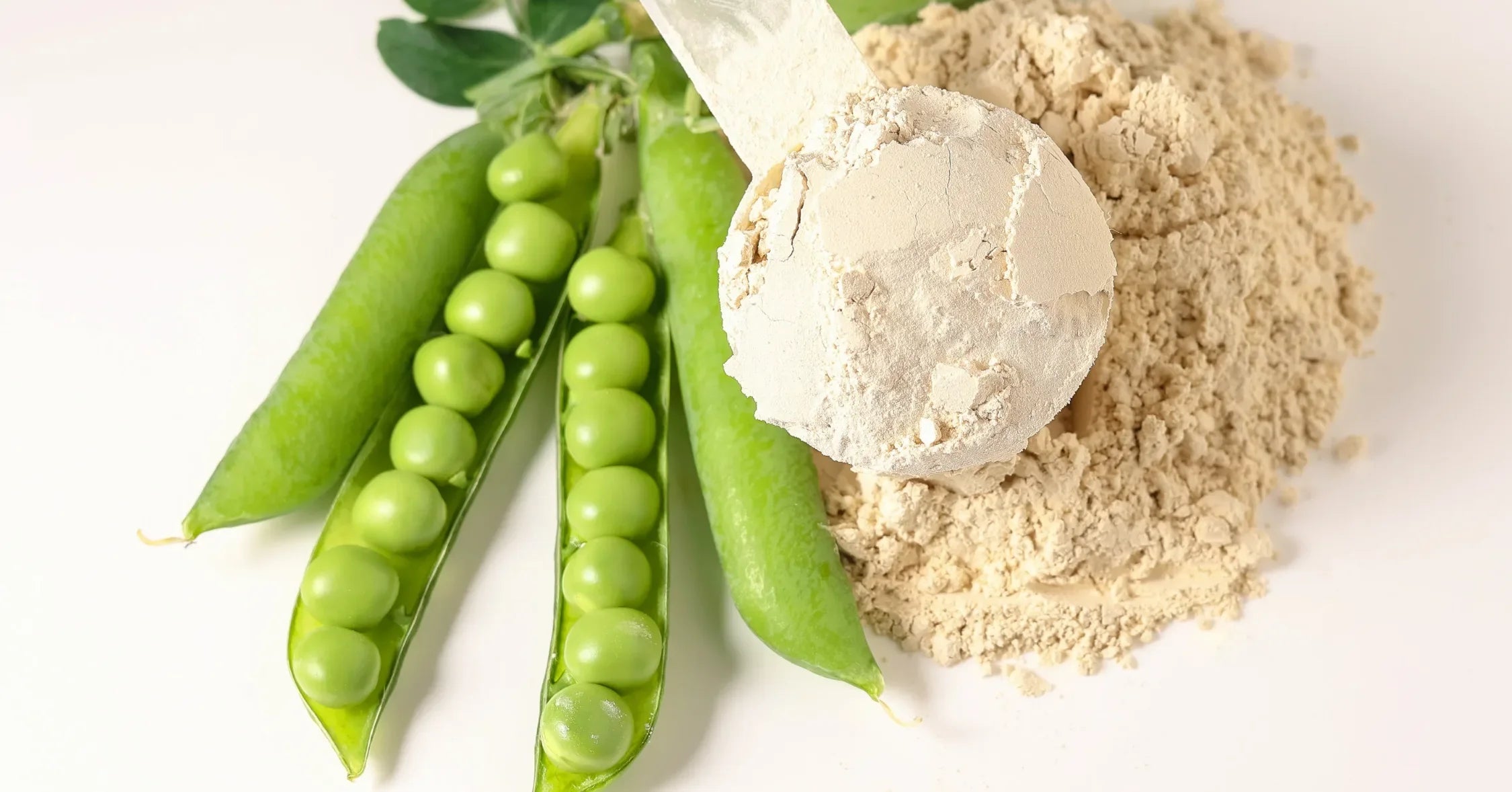Protein powders have become one of the most popular supplements in the world of fitness and nutrition. Whether you are trying to build muscles or lose weight, or just eat healthier, a good protein powder can make your diet easier and more balanced. But with so many options, one question keeps coming up: Is pea protein a complete protein?
If you have switched to a plant-based diet or just want a cleaner protein source, you have probably heard about pea protein powder. It's completely vegan, dairy-free and gentle on digestion, but is it as effective as whey protein?
In this guide, you will learn everything about pea protein and what makes it really complete.
What exactly is pea protein?
Pea protein comes from yellow split peas, not the green peas that you eat for dinner. The peas are rich in protein and are processed into a fine powder by removing most of the starch and fibre.
The result is a clean, high-protein supplement that’s ideal for people looking for a vegan or vegetarian protein source, as well as those seeking dairy-free or gluten-free nutrition. It’s also easy to digest and hypoallergenic.
You must know that pea protein has gained massive popularity because it's naturally sustainable and also very easy to mix into shakes and smoothies.
A study published in the Journal of the International Society of Sports Nutrition (2015) found that pea protein is just as effective as whey protein for building muscle when taken after resistance training.
What does complete protein really mean?
To understand whether pea protein is a complete protein or not, you first need to know what “complete” actually means.
Your body needs 20 amino acids to function properly. Out of these, 9 are called essential amino acids, which your body cannot make on its own.
You have to get them from the food you eat. A complete protein simply contains all nine essential amino acids in the right amounts. These 9 essential amino acids are:
-
Histidine
-
Isoleucine
-
Leucine
-
Lysine
-
Methionine
-
Phenylalanine
-
Threonine
-
Tryptophan
-
Valine
So is pea protein a complete protein?
Here’s the interesting part: pea protein is almost complete. It contains all the essential amino acids but is low in methionine, one of the sulphur-containing amino acids.
This means pea protein provides a broad amino acid profile, but to make it fully complete, you can combine it with another plant protein that has more methionine, like rice protein or chia protein.
That’s why most high-quality protein powders, including Immunosciences Pure Plant Protein, are blends of pea protein and other plant proteins. Together, they create a complete amino acid profile for people looking to support optimal muscle and tissue repair.
Why does pea protein still stand out?
Even though it’s slightly low in methionine, pea protein still has many major advantages. It is rich in branched-chain amino acids, which are very important for muscle growth and recovery. It also has a good amount of lysine, which supports collagen production and strengthens immune function.
You can say that pea protein is gentle on digestion, unlike whey protein, which can cause bloating for some people. It’s also safe for those who cannot have soy, dairy, or gluten, as it’s free from common allergens.
Pea protein is also sustainable because peas require less water and energy to grow compared to animal-based sources.
In short, pea protein may not be perfect on its own, but it’s one of the healthiest, cleanest, and most efficient protein sources available.
Also Read: What is Plant-Based Protein Powder? Everything You Need To Know
Benefits of Pea Protein
Supports muscle growth and recovery
Pea protein is rich in leucine, the amino acid responsible for triggering muscle protein synthesis. When taken after workouts, it helps repair muscle fibres and promotes lean muscle growth.
Helps with weight management
Protein increases satiety, meaning it keeps you full for longer. Pea protein shakes can help control cravings and naturally reduce calorie intake.
A study published in the American Journal of Clinical Nutrition (2011) found that people who consumed higher-protein diets lost more fat while maintaining muscle mass.
Boosts heart health
Pea protein may help lower cholesterol and blood pressure levels. It’s naturally low in saturated fat and contains beneficial peptides that support heart function.
Supports gut health
Unlike dairy products, pea protein is gentle on digestion and less likely to cause bloating. It also contains small amounts of fibre that help maintain a healthy gut.
Also Read: 10 Health Benefits of Plant-Based Protein Powder for Fitness
How to use pea protein powder?
Adding pea protein powder to your daily routine is really easy. You can mix one scoop with water, almond milk, or smoothies. Blend it with banana, spinach, or peanut butter for extra flavour.
You can also stir it into your breakfast for an added protein boost. Combine it with vitamin C–rich foods to enhance absorption and support collagen production.
Comparison of Various Plant-Based Proteins
|
Protein Type |
Complete Protein? |
Digestibility |
Key Features |
Best For |
|
Pea Protein |
Almost (low methionine) |
Easy |
Vegan, allergy-friendly, high in BCAAs |
Daily use, muscle recovery |
|
Whey Protein |
Yes |
May cause bloating |
Fast-absorbing, dairy-based |
Muscle gain, post-workout |
|
Soy Protein |
Yes |
Moderate |
Plant-based, but may affect hormones |
Vegans (limited use) |
|
Rice Protein |
(low lysine) |
Gentle |
Grain-based, hypoallergenic |
Sensitive digestion |
|
Hemp Protein |
Almost |
Good fiber |
High in omega-3s |
General wellness |
|
Immunosciences Plant Protein Powder |
Yes (pea + rice blend) |
Easy |
Complete amino acid profile |
Daily lifestyle, fitness enthusiasts and vegan athletes. |
Also Read: Plant Protein vs Whey Protein: A Complete Comparison Guide
Conclusion
So, is pea protein a complete protein? Technically, pea protein contains all 9 essential amino acids, but it’s slightly low in methionine.
When combined with other complementary plant proteins, it becomes a complete, well-balanced protein that supports muscle growth, recovery, and overall wellness.


